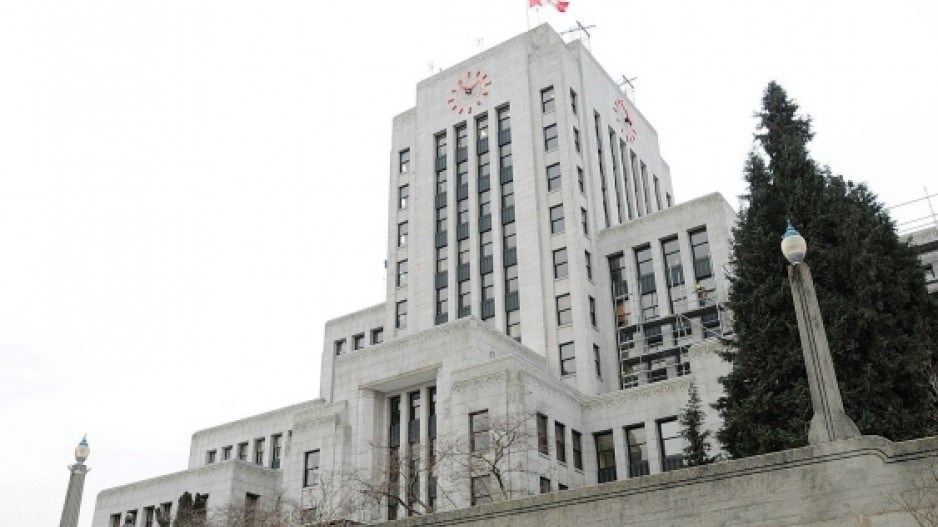A city staff report released Wednesday estimated loss in revenues could range from $60 million between March and May to $190 million by year’s end.
Such a dire financial situation prompted Mayor Kennedy Stewart to call Wednesday on the provincial government for an injection of up to $200 million in cash.
“We are bleeding money right now,” Stewart told reporters at a news conference at city hall. “The province has better projections on how long [this pandemic] is going to last. However, we need to do economic planning and that’s why the ask for an initial disbursement of up to $200 million.”
Much of the city’s loss in revenues is related to the closure of community centres, libraries, civic theatres and suspending parking enforcement, as reported by
The city also relies on gaming grants, bylaw and library fines and revenue from permit and licence fees for its operating budget, which is $1.6 billion this year.
“The decrease in revenue resulting from these closures, combined with potentially higher delinquency in payments for property tax and utility fees, creates a significant financial and cash flow challenge,” said the staff report, noting 1,500 city workers were temporarily laid off last month as a result of revenue loss.
Minister of Municipal Affairs Selina Robinson said in an emailed statement Wednesday to Glacier Media that she is in regular touch with the City of Â鶹´«Ã½Ó³»and other municipalities.
Robinson said the government’s immediate focus has been on relief for people, but realizes the pandemic has also caused financial hardship for Â鶹´«Ã½Ó³»and B.C. municipalities.
“We are working closely with our partners, including the Municipal Finance Authority and the Union of B.C. Municipalities, to develop solutions and a path forward to support local governments like Â鶹´«Ã½Ó³»and will have more to say as soon as we can in the coming weeks,” she said.
The report noted that every 10 per cent increase in the number of people who don’t pay their taxes results in a $130 million decrease in property tax and utility payments received.
The city has legal mechanisms to recover unpaid property taxes from the sale of property. But the process can take multiple years, and in the interim, the city must fund operations.
To lessen the blow for citizens and business operators, city council will consider a number of relief measures at its April 14 meeting, including:
• Deferring the property tax due date for citizens from July to September, as reported by Glacier Media last week.
• Request the provincial government delay until September the city’s collection of taxes for school, transit and other regional fees.
• Deciding whether to follow the regional mayors’ lead in their call to have the B.C. government expand the existing provincial property tax deferment program to support property owners facing financial hardship.
Such a deferment would also apply to residents and non-profit agencies who don’t currently qualify for the program. The city’s goal in this request is to reduce the number of people who may not be able to pay their taxes.
The report noted more than 15,000 Â鶹´«Ã½Ó³»businesses closed temporarily to follow provincial health guidelines related to physical distancing.
“Â鶹´«Ã½Ó³»will be a crucial driver of economic recovery for the region, province and the nation,” the report said. “However, the financial impacts to the city resulting from the pandemic are severe, and like all municipalities, the funding capacity to deal with unprecedented events such as this is limited and the support of senior governments is needed.”
In B.C., roughly 80 per cent of local government operating budgets are funded by property taxes and utility fees. Parking, community centres, recreation programs and permits augment that revenue.
Unlike provincial and federal governments, municipalities cannot run deficits or borrow to balance operating budgets. A big driver of a city’s budget are police and fire services.
The city maintains a number of cash reserves, many of which are legally restricted for specific purposes — including “the sinking fund” and the empty homes tax — and cannot be redirected to fund budget deficits.
The city maintains what it calls a “general revenue stabilization reserve” worth about $130 million. The money has been reserved for various needs, including storm and snow response.
The staff report says the city could dip into the reserve, but only to a recommended level of $35 million, which would not be sustainable.
The report noted the economic impact of the pandemic could last three to four years, which would end up depleting the reserve.
Council’s April 14 meeting begins at 9:30 a.m. and will be livestreamed via the city’s website.
@Howellings



